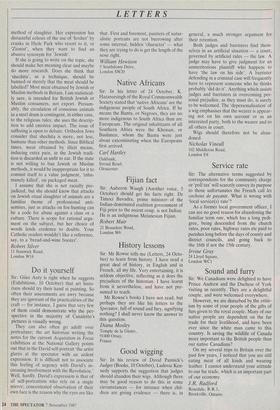Shechita
Sir: Alexandra Artley (Diary, 24 October) reveals extraordinary insensivitiy to lan- guage. She uses the phrase 'kosher-kill' twice to refer to Jewish ritual slaughter. Alliteration, no doubt, was too much for her. Was there a missing `ing'? In Judaism, `kosher' meat is the result; `shechita' is the
LETTERS
method of slaughter. Her expression has distasteful echoes of the use of 'kosher' by cranks in Hyde Park who resort to it, or `Zionist', when they want to find an abusive synonym for 'Jewish'.
If she is going to write on the topic, she should make her meaning clear and maybe do more research. Does she think that `shechita', as a technique, should be banned or merely that the meat should be labelled? Most meat obtained by Jewish or Muslim methods in Britain, I am statistical- ly sure, is intended for British Jewish or Muslim consumers, not export. Presum- ably, the circulation of conscious animals in a steel drum is contingent, in either case, to the religious rules; she uses the descrip- tion to add emotive impact. The issue of suffering is open to debate. Orthodox. Jews consider that shechita is more, not less, humane than other methods. Since Biblical times, meat obtained by illicit means, inducing extra pain, in the Jewish tradi- tion is discarded as unfit to eat. If the state is not willing to ban Jewish or Muslim methods, it would be inappropriate for it to commit itself to a value judgment, 'inhu- manely killed', on packaged meat.
I assume that she is not racially pre- judiced, but she should know that attacks on Jewish ritual slaughter of animals are a familiar theme of professional anti- semites, just as attacks on fox-hunting can be a code for abuse against a class or a culture. There is scope for rational argu- ment on the subject, but her choice of words lends credence to doubts. Your Catholic readers wouldn't like a reference, say, to a 'bread-and-wine boozer'.
Robert Silver
11 Stanwick Road, London W14



































































 Previous page
Previous page